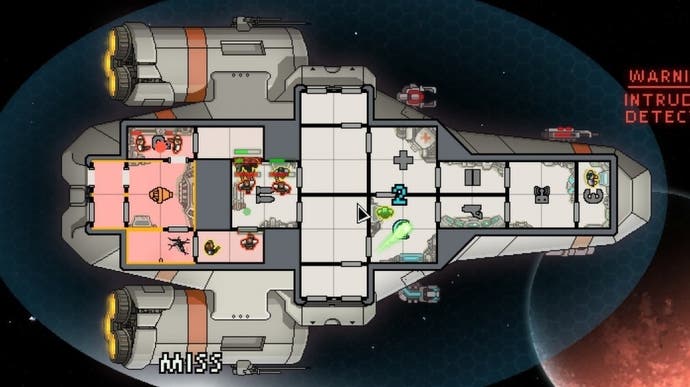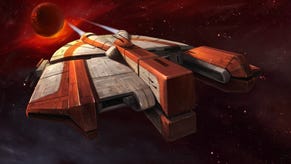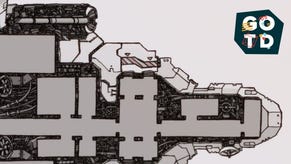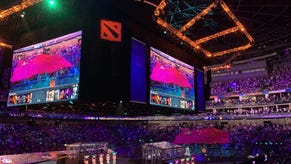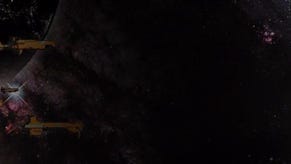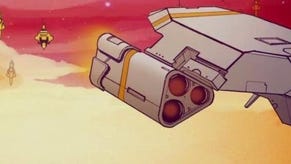Blind choice and blind luck: the magic of FTL's superlative decisions
Chance is a fine thing.
Choice is everything in FTL: Faster Than Light, a game I've returned to recently and would now quite happily swear to never leave again. FTL is, above all, a game about deciding what to do. Where to travel, when to buy, what to shoot - even where your little crewmember stands, if you're lucky enough to have one spare. You can drill down to the most micro of micromanagements or the broadest, most profound of overarching concepts in FTL and it will always, always come back to it. Choice, choice, choice. But where its choices really stand out - and where FTL itself stands out, even all these years after release - is when it asks you to make those choices blind.
Blind choices are, I find, often pretty awful. The big, clunkily jammed-in blind narrative choice with a side of disappointing consequence is all the rage amongst open-world blockbusters. More often than not it feels put there because core demographics respond well to the buzzwords, and more often than not it's the worst thing about the game it's in. Working your way through forty, fifty, eighty-odd hours of a game to find you got the bad ending by killing the wrong Named Enemy when you left the tutorial area - probably six months ago, by my rate of playing - is not, in my humblest of opinions, fun. You return from war, triumphant, to find your home town burned down because you said something mean to some guy (who was a douche and totally deserved it), and he went on a rampage while you were away. Or you can't, I don't know, play a good ten hours more of a game you're loving because you didn't feed the giant fish a peach three times and hop on one leg (this sounds like Sekiro but that gets a pass because it's ridiculous enough to be good, actually, so ignore that one). You get the point. I'm acutely aware it might just be me that struggles with blind choice and consequences, and I'm aware that entire studios (BioWare) built a reputation on them, but still. Not a fan.
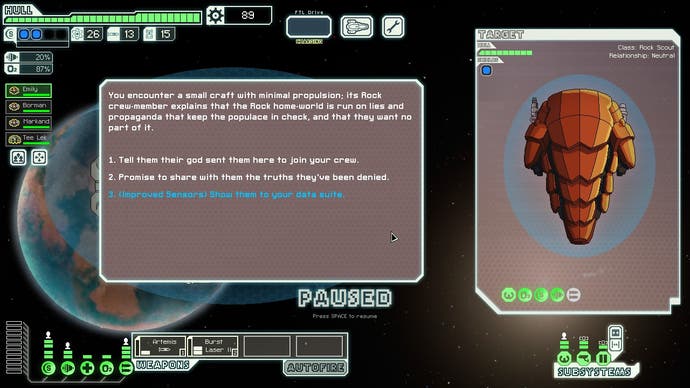
But FTL! Of course FTL, the perfect video game, gets this right. For some reason I find blind choice in FTL the absolute opposite to blind choice everywhere else, refusing to look up the chances of success or the possible outcomes when, in just about every other game, I'd rather spoil the entire thing for the sake of getting the decisions right. I think part of it is just not being as invested in those stories - Assassin's Creed Odyssey is wonderful, for instance, but I play it for all the frolicking about on Mykonos and Spartan-punting people off ledges, not for the sporadic choice-based melodrama - whereas in FTL the consequence is the gameplay, and the gameplay is the story. You lose Dustin the Engi to giant alien spiders, and you're also losing your ship's best engineer and a level two weapons expert you've been training up for the entire run. You lose that guy and it matters, so you actually feel it, so you actually care about maintaining the surprise and the veil of ignorance around what decision most often leads to what. Inadvertently ruining Kassandra's story by stabbing some dude who it really seemed like you ought to stab is just a bit of a bummer.
There's another thing FTL throws in, though, that makes these specifically narrative choices - the ones in the event pop-ups when you reach a new sector, and have to choose between defending an innocent trader from pirates or sneaking by; or sending crew to help put out an ally ship's fire entirely over rescuing the few that could escape - really pop, above the rest. Random chance, that thing we're all supposed to hate, is really the secret ingredient in FTL. Giant alien spiders are a great example (I'm using this again because it's not one that spoils anything really interesting and, also, because it's a dumb, well-worn joke that I love). The risk is actually quite high - there's a very good chance you'll lose a crewmember, who can be incredibly valuable - and the reward, if successful, is pretty low. It's just a little, dangling bit of temptation. You know something could go wrong (giant alien spiders are no joke!), but it could also go right! "Surely," you might say to yourself as an inexperienced player, "there wouldn't be something as intimidating as giant alien spiders without a worthy payoff." And you'd be wrong, because the payoff's mostly quite naff. But the joy of that event is the lesson it teaches you, after the fourth or fifth crewmember you've lost in the ten or eleven times you've gambled on it in a fresh run. Giant alien spiders are never worth it, but chance is the thing teaching you that.
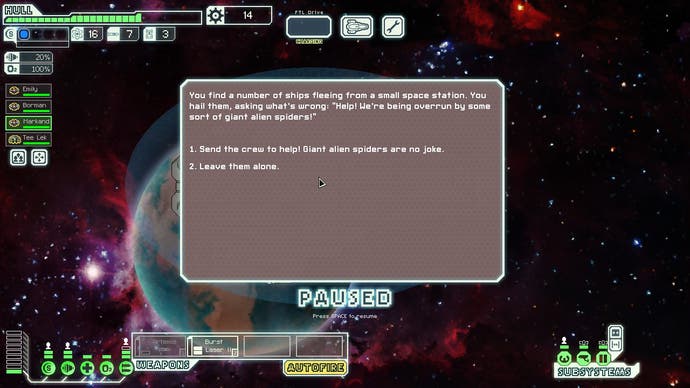
I could look up the best decisions to make in FTL in the same way I tend to double-check who not to punt off a ledge in Assassin's Creed and, knowing me, I would probably enjoy playing the game that way too. But the fact that I'm resisting the urge to do so, all these years on from launch, against all my innate desires to min-max and optimise and calculate, says an awful lot. In FTL random chance works. And because its randomness works, its decisions - themselves gambles - work too. Chance is a fine thing when it's done right, just like decisions and choice and consequence. But it does have to be done right.
